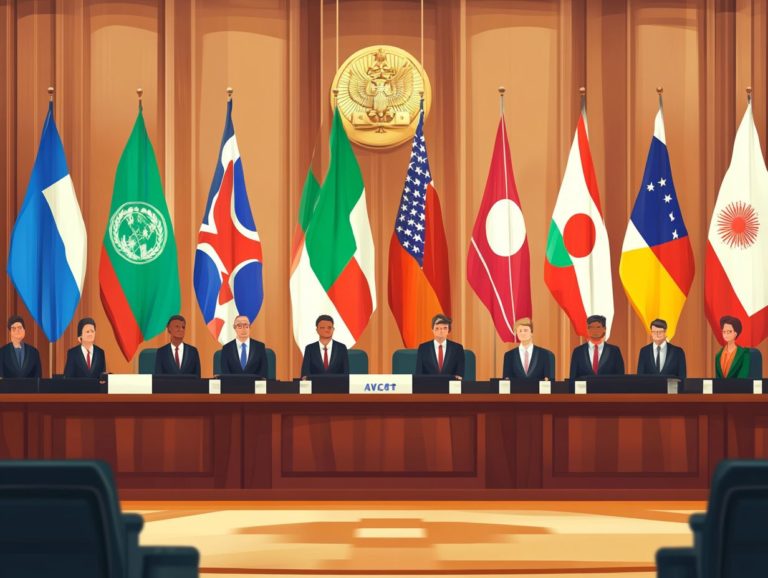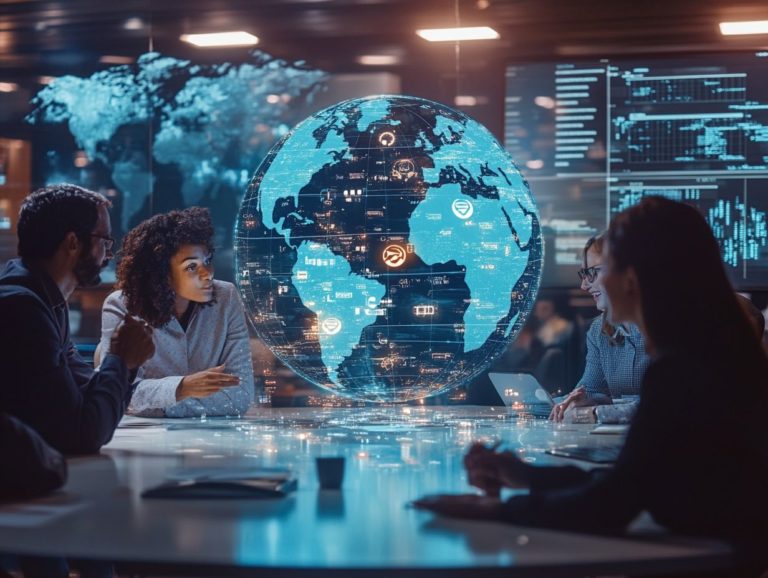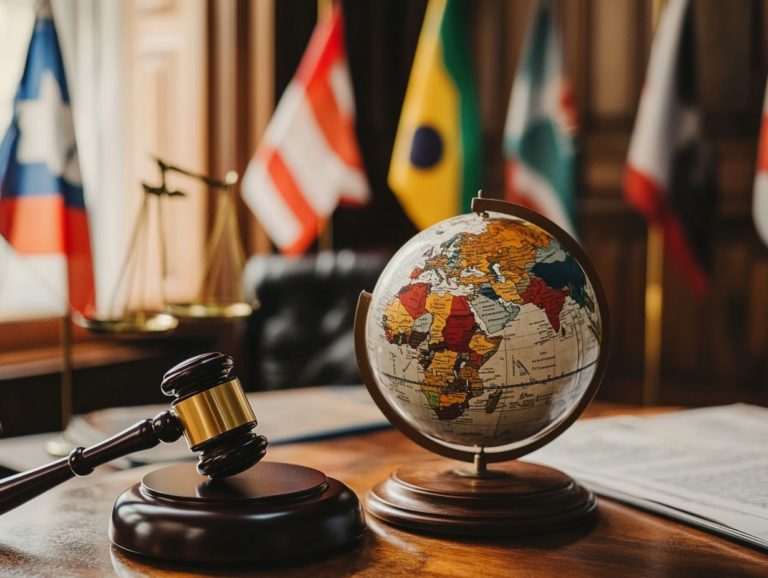The Challenges of IP Law in the Age of Globalization
In an increasingly interconnected world, you ll find that intellectual property (IP) law has never been more vital. As you navigate the complexities of protecting your innovations across borders, you ll encounter unique challenges and opportunities.
This article delves into the definition and purpose of IP law, examining how globalization impacts its landscape and addresses current issues related to enforcement and international disputes.
It also highlights effective strategies for safeguarding your intellectual property. Furthermore, it discusses the role of international organizations in promoting harmonized laws.
Lastly, it looks at the future of IP law as globalization continues to reshape legal frameworks. Join in to gain insight into the evolving nature of intellectual property in today s globalized environment.
Contents
- Key Takeaways:
- Overview of Intellectual Property Law
- The Impact of Globalization on IP Law
- Current Issues in IP Law
- Protecting Intellectual Property in a Globalized World
- The Role of International Organizations in IP Law
- The Future of IP Law in the Age of Globalization
- Frequently Asked Questions
- What is the importance of IP law in the age of globalization?
- What are the main challenges of IP law in the age of globalization?
- How does globalization affect the protection of intellectual property?
- What are some ways in which IP law is adapting to globalization?
- How does globalization impact the balance between protection and access to intellectual property?
- What role do multinational corporations play in the challenges of IP law in the age of globalization?
Key Takeaways:
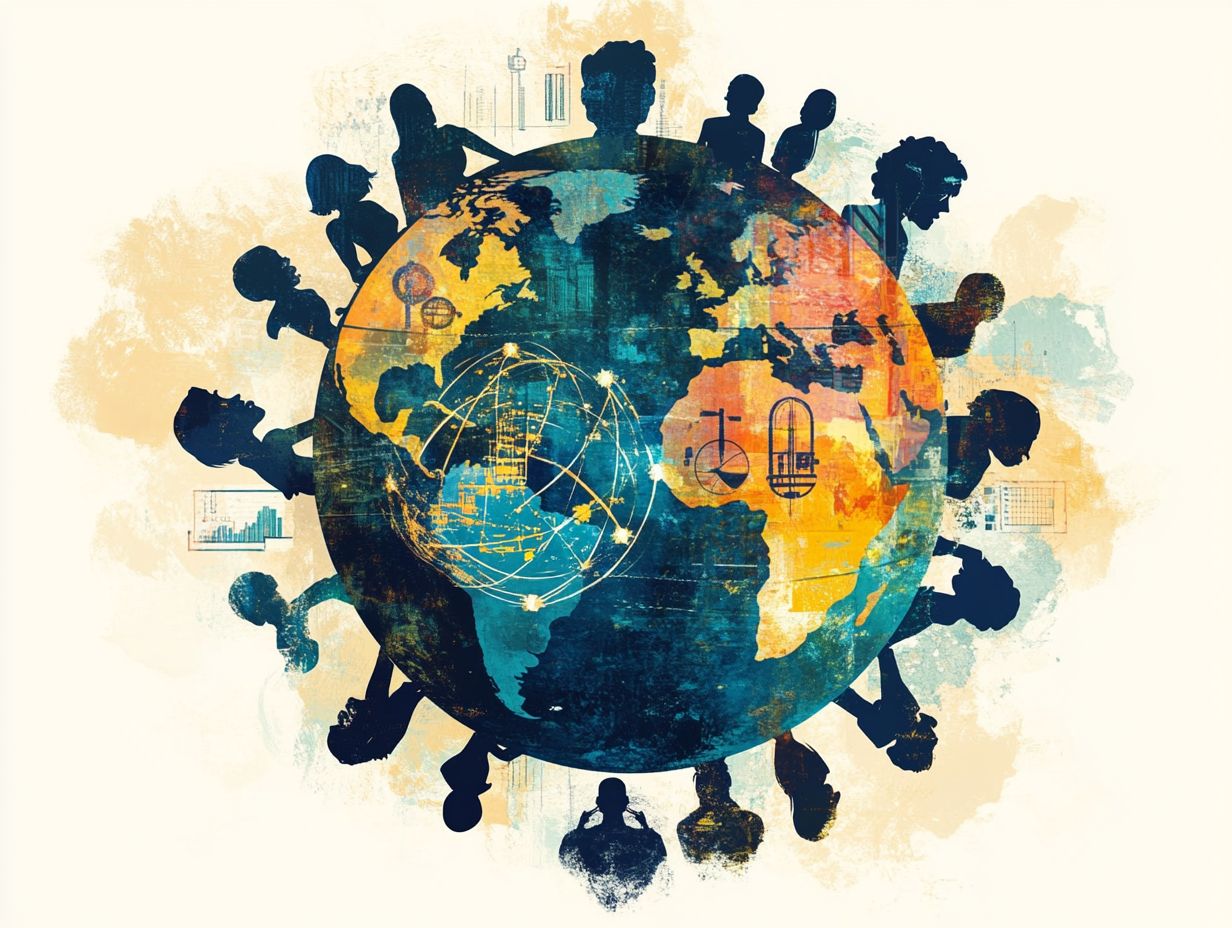
Globalization has changed IP law, creating challenges and exciting opportunities for protection and enforcement, making it essential to explore the future of international IP law.
International disputes and enforcement pose significant challenges for IP law, highlighting the need for understanding the impact of digital technology on international IP law, which requires strategies and tools for protection in a globalized world.
International organizations are vital in making IP laws stronger and more unified worldwide.
Overview of Intellectual Property Law
Intellectual Property (IP) Law is a crucial pillar of contemporary legal frameworks, designed to protect what creators make. It safeguards the rights of creators and stimulates innovation in an increasingly competitive global economy.
By offering robust protection for intellectual assets such as patents, copyrights, trademarks, and trade secrets, IP law plays an instrumental role in shaping economic outcomes across various industries. This is especially true in the digital age.
As technological advancements redefine market dynamics and fuel economic growth, strong IP rights are a must-have for success in both developed and emerging markets.
This overview will explore the essence of IP law, its objectives, and its profound impact on R&D investment and innovation across different sectors.
Definition and Purpose
The concept of Intellectual Property encompasses a range of legal rights that empower you as a creator to maintain control over your inventions, artistic works, brand identities, and trade secrets.
These protections are vital for cultivating an environment where innovation can flourish, allowing you and your business to fully benefit from your creative efforts.
Copyrights, for instance, safeguard your original works of authorship. They ensure that you receive both recognition and financial rewards for your contributions.
Patents serve a different purpose they protect your inventions, granting you exclusive rights for a set period. This fosters a culture of research and development.
Trademarks help distinguish your products and services in the marketplace. They assist consumers in recognizing the source and quality associated with your brand.
Trade secrets protect confidential business information that gives a competitive edge. Collectively, these forms of Intellectual Property not only safeguard your individual rights but also stimulate economic growth by promoting innovation and ensuring a fair marketplace.
The Impact of Globalization on IP Law
Globalization has significantly shaped Intellectual Property (IP) Law, offering both challenges and opportunities for you as a creator or investor in today’s swiftly evolving economic environment. To stay informed, it’s important to understand global trends in IP law.
As global markets expand and international partnerships thrive, the necessity for strong legal frameworks to safeguard intellectual assets becomes paramount.
This change really affects your investments in research and development and the transfer of knowledge. This is particularly true in emerging economies, where economic disparities can be intensified by inadequate IP laws.
Grasping these dynamics is crucial for you to effectively navigate the complexities of international trade and foster innovation on a global scale.
Challenges and Opportunities
Globalization brings both challenges and opportunities for protecting Intellectual Property (IP), especially for emerging economies facing digital piracy and intense competition, as highlighted in the impact of globalization on IP strategy.
The flow of digital content across borders complicates enforcing IP rights. Different countries show varying dedication to protecting IP, creating a patchwork of enforcement that leaves many creators vulnerable.
As you expand internationally, you will navigate different legal systems and cultural views on IP. However, this landscape also offers chances to build valuable partnerships.
Effective IP strategies can give you a competitive edge. By protecting your innovations, you foster collaboration across nations, attract foreign investment, and enhance your global presence.
Current Issues in IP Law
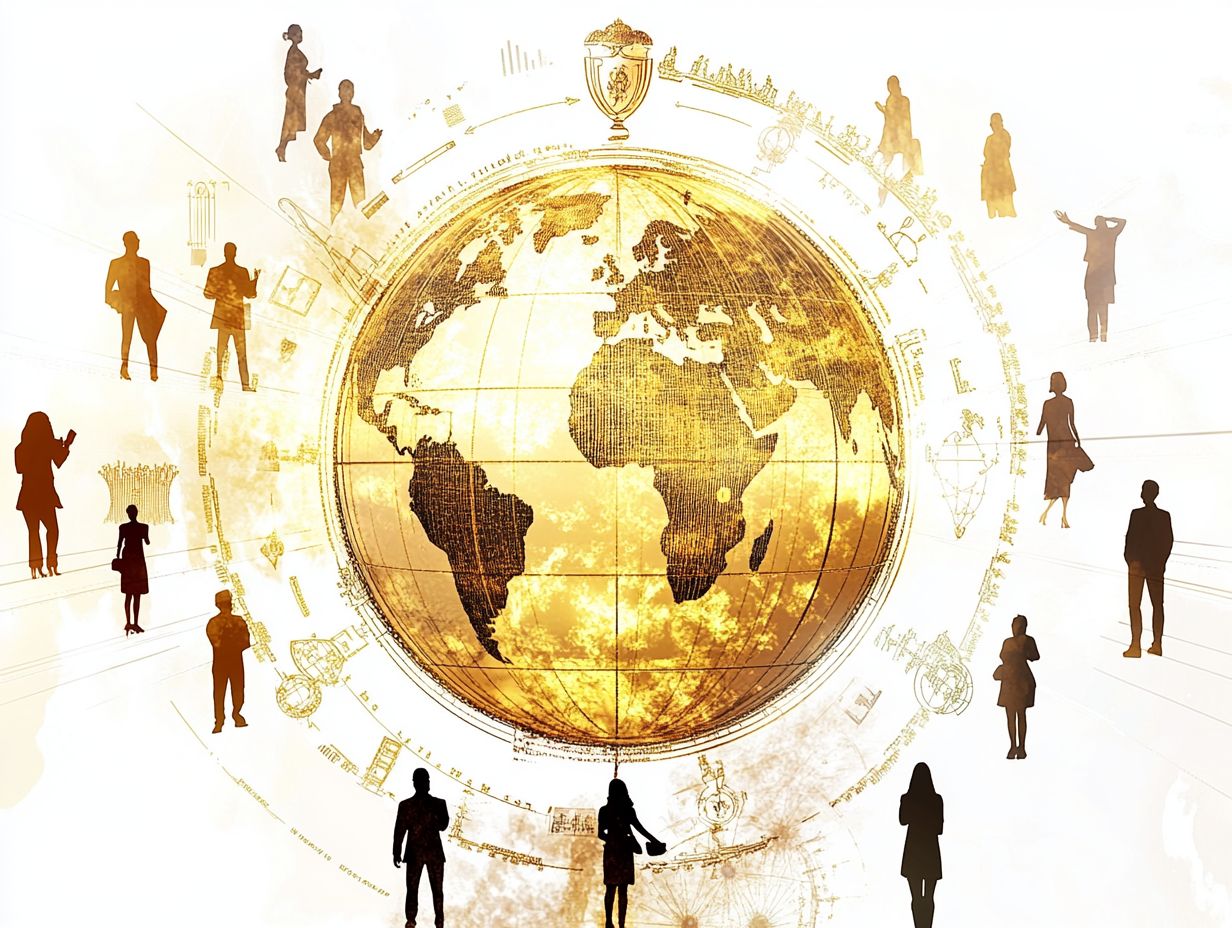
Current challenges in Intellectual Property Law present diverse issues that demand your attention, including international disputes and the effectiveness of enforcement mechanisms within existing legal frameworks, as outlined in the future of IP strategy in the digital age.
As technological advancements sprint ahead of traditional copyright and patent laws, the value of trademarks and the protection of trade secrets, or confidential business information that gives a company a competitive edge, come under increasing scrutiny.
This evolving landscape calls for thorough exploration of how existing IP laws can adapt, ensuring robust protection and equitable enforcement across various jurisdictions.
International Disputes and Enforcement
International disputes in Intellectual Property arise when conflicting laws and enforcement mechanisms hinder the protection of your intellectual assets across borders. These disputes unravel intricate issues where differing legal frameworks clash, leaving you vulnerable as an intellectual property owner.
For instance, consider a prominent tech firm involved in a litigation battle over trade secrets with a competitor in another country. The complexity escalates when patent regulations vary significantly, as seen in disputes between pharmaceutical companies regarding life-saving drugs.
Copyright challenges, especially for content creators navigating the digital landscape, illustrate these enforcement hurdles, particularly when jurisdictions interpret copyright laws differently. These examples highlight the urgent need for a harmonized approach to IP law, ensuring that you and other creators can effectively safeguard your works globally.
Protecting Intellectual Property in a Globalized World
In today s global landscape, safeguarding your Intellectual Property (IP) has become a strategic necessity for businesses looking to maintain their competitive edge and protect their innovations from infringement.
To tackle the intricate challenges of market access, effective IP protection strategies such as solid licensing agreements and digital rights management are essential.
As you strive to leverage strong IP rights and harness their economic potential, adopting comprehensive protective measures has never been more vital.
Strategies and Tools for IP Protection
Effective strategies for protecting your intellectual property encompass various tools and approaches, including licensing agreements, digital rights management, trademark registration, and patent filing.
These methods not only safeguard your unique inventions and branding against unauthorized use but also empower you to maintain a competitive advantage in a crowded marketplace.
For example, by implementing digital rights management, you can control access to your software and digital content, reducing the risk of piracy. Trademark registration can significantly enhance your brand recognition and loyalty, as seen with global titans like Coca-Cola and Nike.
It s essential to tailor these strategies to both your local and international contexts, ensuring compliance with different legal systems while maximizing your reach and effectiveness.
The Role of International Organizations in IP Law
International organizations are at the forefront of shaping and enforcing Intellectual Property (IP) Law. Prominent entities like the World Trade Organization (WTO) and the World Intellectual Property Organization (WIPO) spearhead initiatives to harmonize legal frameworks across the globe.
Central to this effort is the TRIPS Agreement, a treaty that sets rules for protecting intellectual property internationally and encourages member states to adhere to these standards.
This section delves into how these organizations actively contribute to creating a cohesive global landscape for intellectual property.
Efforts to Harmonize and Strengthen IP Laws
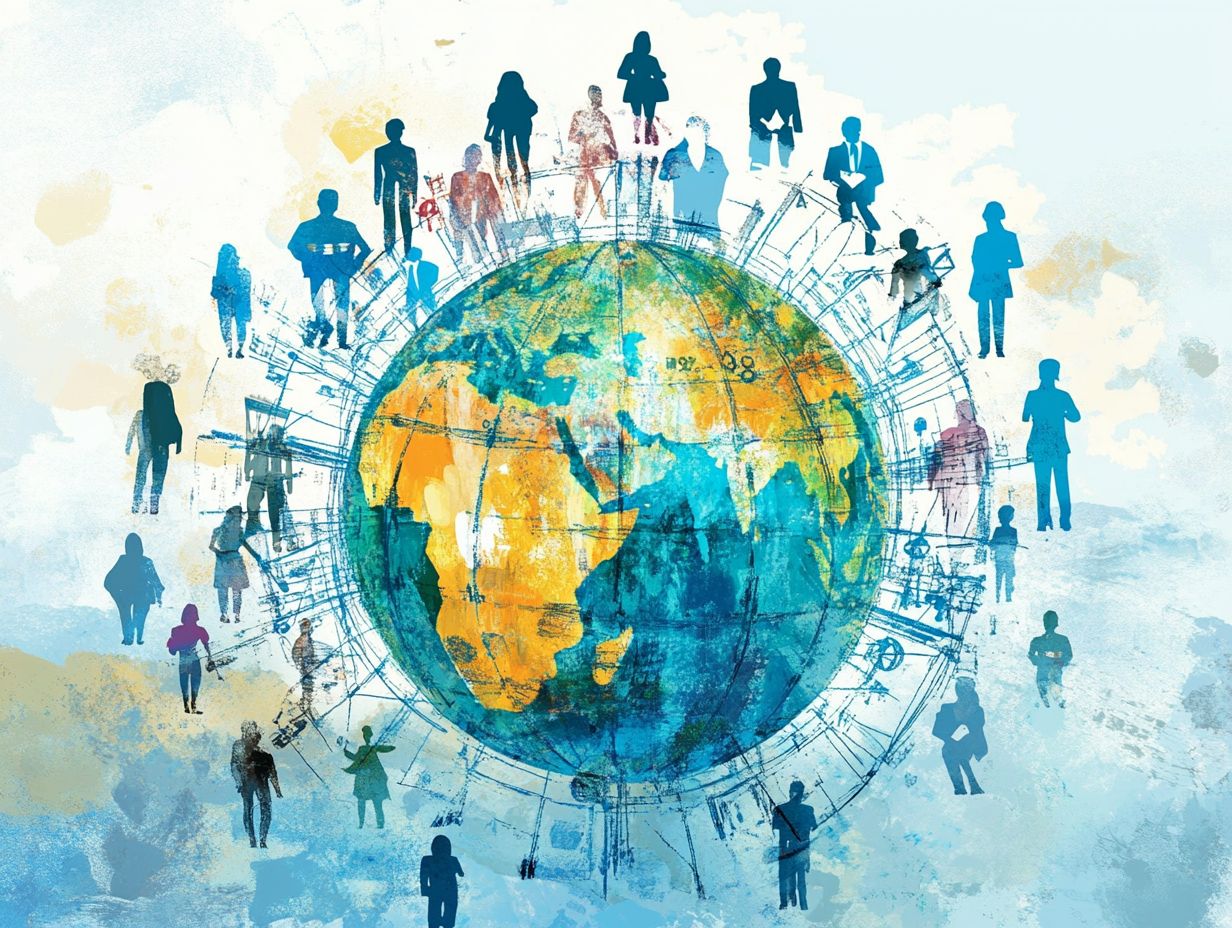
Your efforts to harmonize and strengthen Intellectual Property laws are essential for ensuring consistent enforcement and protection across different areas. This is critical in today s globalized economy, where ideas and innovations cross borders effortlessly.
International agreements, like the Trade-Related Aspects of Intellectual Property Rights (TRIPS) Agreement, set minimum legal standards for IP protection that member countries should follow. Despite these frameworks, challenges remain, especially in enforcing laws and dealing with diverse national regulations.
This is where collaboration comes into play. Nations must unite to tackle these disparities, sharing best practices and resources to cultivate a more cohesive approach to intellectual property rights protection.
The Future of IP Law in the Age of Globalization
The future of Intellectual Property Law is rapidly evolving and full of potential, fueled by swift technological advancements and changing economic dynamics.
As emerging technologies continue to redefine industries, IP laws must adapt to remain relevant and effective in safeguarding innovations.
This changing landscape may usher in policy shifts that emphasize enhanced digital rights management and stronger protections for intellectual assets. This ensures that creativity and innovation are well-protected in the digital age.
Predictions and Potential Changes
Predictions for the future of IP law suggest that we may soon encounter significant changes driven by the rise of the digital economy. There is a pressing need for updated copyright laws to tackle emerging challenges.
As technological advancements reshape the way creative content is produced and consumed, legal experts agree that existing frameworks might struggle to keep pace. The rise of artificial intelligence and blockchain technology could compel us to reevaluate traditional copyright enforcement mechanisms.
These shifts may introduce new compliance requirements for businesses, ensuring that intellectual assets are protected more effectively in an ever-evolving landscape. Ultimately, adapting IP laws to accommodate these innovations could enhance both protection and commercialization of creative works, benefiting artists and companies alike.
Frequently Asked Questions
What is the importance of IP law in the age of globalization?
IP law is essential because it protects your creative ideas and fuels innovation. It also plays a vital role in promoting fair competition and trade on a global scale.
What are the main challenges of IP law in the age of globalization?
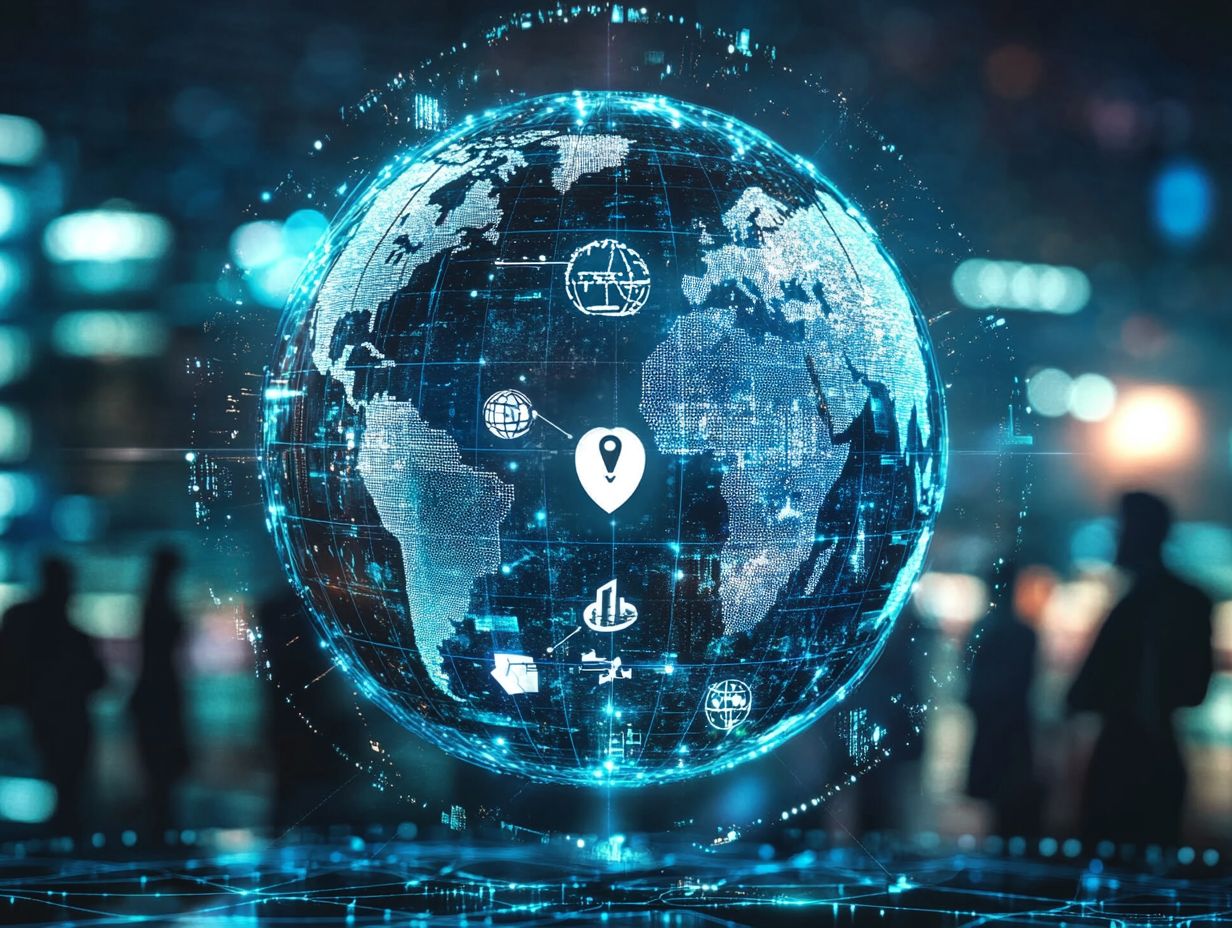
The main challenges of IP law in the age of globalization include the difficulty in enforcing laws across different countries with varying legal systems, the rise of online copyright and trademark infringement, and the impact of globalization on IP litigation, as well as the protection of traditional knowledge and cultural expressions.
How does globalization affect the protection of intellectual property?
Globalization has made it easier for intellectual property to be infringed upon, as it allows for easier and faster distribution of goods and information. It has also made it more challenging to monitor and enforce IP rights globally, highlighting concerns about the future of IP litigation in a digital age.
Stay informed about changes in IP law and how they might affect you personally or professionally!
What are some ways in which IP law is adapting to globalization?
Countries are working to align their IP laws through international treaties. One key agreement is TRIPS, which sets rules for intellectual property rights across nations.
There is also a rising emphasis on digital copyright. Protecting traditional knowledge and cultural expressions is becoming increasingly important.
How does globalization impact the balance between protection and access to intellectual property?
Globalization allows easier sharing of information and goods. This can create tension between protecting IP rights and ensuring access to ideas and products.
The balance is continuously reviewed in response to global changes. Ongoing debates shape how we approach intellectual property in this context.
What role do multinational corporations play in the challenges of IP law in the age of globalization?
Multinational corporations have a major influence on IP law challenges today. Their extensive resources and global operations can both violate and uphold intellectual property rights.
It’s essential for these companies to follow ethical and legal practices. This ensures they respect IP rights while still thriving in a competitive market.

